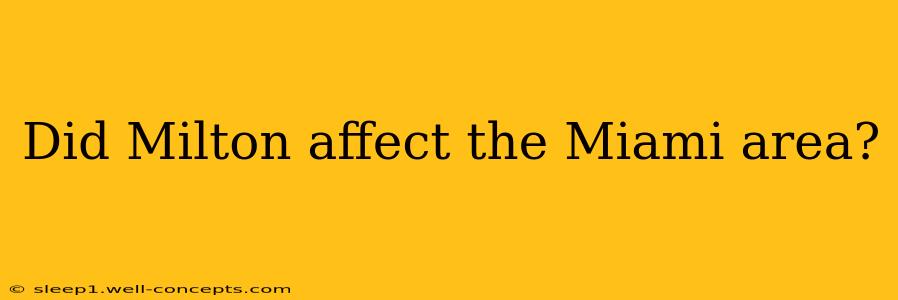While Hurricane Milton directly impacted areas far from Miami, its indirect effects on South Florida, including the Miami area, are worth exploring. The answer isn't a simple yes or no, but rather a nuanced understanding of how distant hurricanes can still ripple through weather patterns and economic systems.
Understanding Hurricane Milton's Path
Hurricane Milton, a powerful Atlantic hurricane, did not make landfall near Miami or anywhere in Florida. Its primary impact zone was far to the north and east. This crucial point clarifies that there were no direct effects like high winds, storm surge, or heavy rainfall associated with the hurricane itself within the Miami area.
Indirect Impacts on Miami: The Butterfly Effect in Meteorology
Even though Miami was spared a direct hit, the atmospheric conditions created by Milton could have had indirect consequences. Large-scale weather systems often interact in complex ways. A hurricane's vast circulation can influence atmospheric pressure and wind patterns over a considerable distance. This can, in turn, affect the formation and trajectory of subsequent weather systems impacting Florida.
Here are some possible indirect effects, although definitively attributing specific weather events solely to Milton's influence is difficult:
- Shifted Jet Stream: A powerful hurricane like Milton can subtly influence the position and strength of the jet stream. This upper-level atmospheric river of wind can have a significant impact on storm tracks and weather patterns across North America, potentially affecting the development or path of systems that later impact Florida.
- Enhanced Tropical Wave Activity: The remnants of a hurricane can sometimes trigger or enhance the development of tropical waves in the Atlantic. These waves, while not hurricanes themselves, can develop into storms further down the line, potentially impacting Florida later in the hurricane season.
- Increased Sea Surface Temperatures: While less direct, the energy released by a major hurricane like Milton could have slightly increased ocean temperatures in the Atlantic, potentially affecting the fuel source for future storm development.
Economic Impacts: A Ripple Effect Beyond Weather
Beyond the realm of meteorology, Milton's influence might be observed indirectly on the Miami economy. Hurricane preparation and recovery efforts in other regions can have consequences for industries like tourism, insurance, and logistics. For instance:
- Tourism Disruptions: If a major hurricane affects another popular vacation destination, tourists might choose Miami as an alternative.
- Insurance Market Fluctuations: The claims from a major hurricane can trigger changes in the insurance market, indirectly impacting insurance costs and availability in Miami.
- Supply Chain Issues: Damage to infrastructure or resources in other areas affected by Milton could create disruptions to supply chains, potentially impacting businesses and consumers in Miami.
Conclusion: Context is Key
While Hurricane Milton did not directly affect Miami, its presence in the Atlantic had the potential for indirect impacts, both on the weather patterns and the economy of the region. The complex interactions within the Earth's atmospheric system make it difficult to isolate Milton's specific influence, but it underscores the interconnectedness of weather phenomena and the ripple effects of extreme events across vast geographic areas. It’s essential to consider these broader contexts when assessing the consequences of even distant hurricanes.
Disclaimer: This analysis is based on general meteorological principles and economic considerations. Precise attribution of specific weather events or economic fluctuations to Hurricane Milton requires detailed analysis beyond the scope of this piece.

